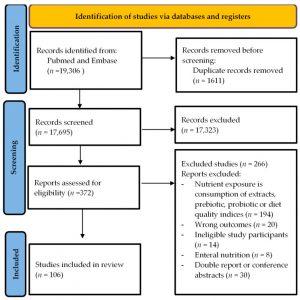Diet plays a critical role in shaping the gut microbiota, which in turn influences various aspects of human health, including immune function and metabolism. This study developed a novel dietary index, the Dietary Index for Gut Microbiota (DI-GM), to assess diet quality based on its effects on gut microbial diversity. The index includes 14 dietary components, both beneficial (e.g., coffee, whole grains, and fibre) and unfavourable (e.g., red meat, processed foods), that were identified through a comprehensive literature review.
More reading: More than a gut feeling: The implication of gut microbiota in the pathology of Alzheimer’s Disease
Coffee, a key component of the DI-GM, has been shown to positively affect gut microbiota by increasing the abundance of beneficial bacteria such as Bifidobacterium and Lactobacillus. These bacteria play crucial roles in maintaining gut health and preventing dysbiosis, a condition linked to various chronic diseases, including obesity and inflammatory bowel disease. The DI-GM was tested using data from the National Health and Nutrition Examination Survey (NHANES), showing a positive association between higher DI-GM scores and biomarkers of gut health, such as urinary enterodiol and enterolactone.
The findings suggest that incorporating gut-friendly foods like coffee into the diet could enhance microbial diversity and contribute to better overall health. The DI-GM provides a useful tool for researchers and clinicians aiming to develop dietary interventions that promote gut health and prevent disease.
In conclusion, this novel dietary index underscores the importance of diet in shaping gut microbiota and offers a practical approach to assessing diet quality in relation to gut health.
Journal Article: Kase, Bezawit E, et al. “The Development and Evaluation of a Literature-Based Dietary Index for Gut Microbiota.” Nutrients, vol. 16, no. 7, 3 Apr. 2024.
Summary by Faith Oluwamakinde











